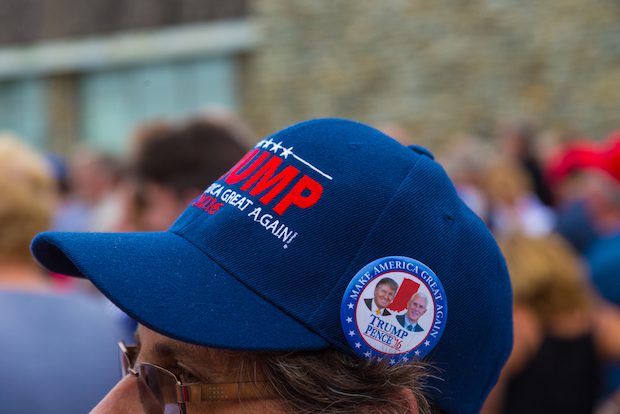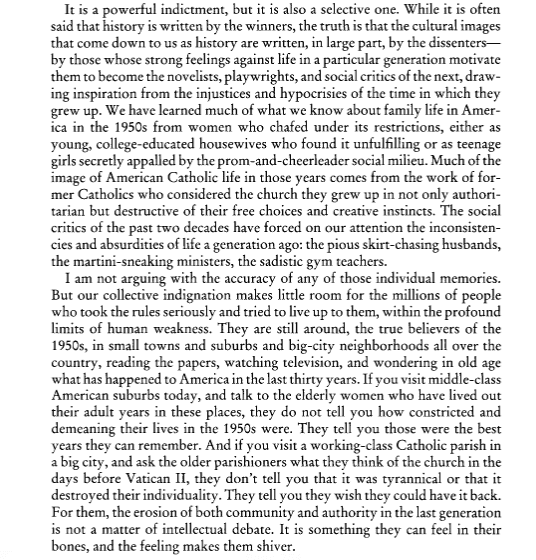Same Bar, Different Worlds

While in Washington this week, I talked about the election with a conservative friend who moves in Republican professional circles. We’re both from Southern states that went heavily for Trump, yet he was as ambivalent about the GOP standard-bearer as I was. I told him that even though I didn’t vote for Trump, it gave me guilty pleasure that so many of the people who look down on the kind of people who voted for Trump were left wailing and gnashing their teeth. And I told him that I had heard from two other conservative friends in other parts of the country who confessed the same thing.
He smiled and nodded.
“You should have seen all these elite Republicans here in DC this year,” he said. “They were pulling their hair out trying to figure out why people kept voting for Trump in the primaries. They literally could not understand it.”
I had to confess that it took me longer than it ought to have done to figure it out, given that I actually live in Louisiana. The bubble doesn’t just cover Washington, DC.
Yesterday afternoon, I had business that took me to a part of Baton Rouge that’s mostly white working class. It was just after two, and I hadn’t had lunch, so I stopped at a neighborhood bar and restaurant that I’d heard had good poboys. The lunch crowd had thinned out, but I decided to sit at the bar and order food.
While I was eating and reading, a man took the stool next to me. He ordered a whiskey from the lady bartender. Then he asked her to make it a double. Who orders a double whiskey at two in the afternoon? I thought, and glanced over at him.
He was white-haired, probably in his mid-50s and prematurely grey, had a bad haircut, a pot belly, and was wearing work clothes. As I ate, he struck up a cheerful conversation with a couple in late middle age on the other side of him. They were drinking too. They talked about work. Whiskey Guy runs a crew of drywallers. Business has been good this year, with the August floods and all. They agreed that it was a shame, but what are you gonna do.
“Where’d you go to school?” the man asked Whiskey Guy.
Whiskey Guy said the name of a Baton Rouge public school, and that he was in the Class of 1981. That answer startled me. I’ve heard that question asked in saloons and at parties many times over the years, as strangers get to know each other, but not since my college graduation have I heard it answered with the name of a high school. Until today.
My hearing is not so great — a hazard of having reviewed rock shows in my first job (I had tinnitis for two days after Van Halen) — so I couldn’t hear most of their conversation. But I did hear laughter. There was an old lady sitting at the end of the bar. She looked like my mother, but her hair was as dark brown and shiny as a new dining table. When the music stopped briefly, I heard her say to the three that her husband had died last year, and this year, she was going to Disney with her grandchildren.
“That’s so nice,” the lady bartender said. “I been about twenty times since I was little.”
Whiskey Guy ordered another double. “I cracked a tooth, and I gotta go to the dentist,” he told the bartender. “I can’t take a needle in my mouth.” They both laughed heartily. He knocked back the shot, paid his bill, said a hearty goodbye to his new friends, and walked out the door.
I finished my shrimp poboy and asked for my check. When I stood up to leave, I looked around the bar and thought: damn, do I live in a bubble, or what? I could have walked into any bar in professional Washington and had more to say to strangers there than I did to these folks — even though they were just like the people I grew up with. And there was no doubt that every one of these people were for Trump. The idea that they voted for Hillary Clinton was … unthinkable. More than that, in retrospect, I can’t see any of the Republican candidates walking into that bar and being able to strike up a conversation with those people as effectively as that Manhattan billionaire who lives in a penthouse.
It’s bizarre to consider, but in retrospect, it makes perfect sense. It’s hard to explain. I’m trying to explain it to myself.
****
On the way home, I swung by the library and picked up a book called Secondhand Time: The Last of the Soviets, by Svetlana Alexievich. It’s an oral history of life in the aftermath of the Soviet Union’s demise. The book was translated into English and published earlier this year. I’m only 30 pages in, and it’s a stunner. Here’s a quote from one man:
I hate Gorbachev because he stole my Motherland. I treasure my Soviet passport like it’s my most precious possession. Yes, we stood in line for discolored chicken and rotting potatoes, but it was our Motherland. I loved it. You lived in a third world country with missiles, but for me, it was a great nation. The West has always seen Russia as an enemy, a looming threat. It’s a thorn in their side. Nobody wants a strong Russia, with or without the communists. The world sees us as a storehouse that they can raid for oil, natural gas, timber, and base metals. We trade our oil for underpants. But we used to be a civilization without rags and junk. The Soviet civilization! Someone felt the need to put an end to it. The CIA … We’re already being controlled by the Americans … They must have paid Gorbachev a tidy sum. Sooner or later, he’ll see his day in court. I just hope that that Judas lives to feel the brunt of his nation’s rage.
Here’s another series of quotes the author collected at a beer stand, where all kinds of people gather, and talk about what’s happened to their country. To be sure, there are plenty of people quoted in Alexievich’s book who hated communism, and aren’t sorry it’s gone. But listen to these voices:
— For me, it’s more of a concrete question: Where do I want to live, in a great country or a normal one?
— Russians need something to believe in … Something lofty and luminous. Empire and communism are ingrained in us. We seek out heroic ideals.
— I am so envious of the people who had an ideal to live up to! Today, we are living without one. I want a great Russia! I don’t remember it, but I know it existed.
— I tried to talk about this with my students … They laughed in my face: “We don’t want to suffer. that’s not what our lives are about.” We haven’t understood a thing about the world we’d only recently been living in and yet we’re already living in a new one. An entire civilization lies rotting on the trash heap …
If you substituted “Americans” for “Russians,” “America” for “Russia,” and “democracy” for “communism,” these lines might have been spoken at a Trump rally this year. Unreasonable? OK, but that’s beside the point. In that Soviet oral history book, I just read a long transcript of a Communist Party member talking like this, at the same time recounting the horrible injustices and suffering communism inflicted on Russia. Her father was sent to the gulag, but came out and spent the rest of his life worshiping Stalin. She misses him and thinks him a hero. It doesn’t make sense, but it’s a profoundly human kind of agony. It’s the Grand Inquisitor’s case. Dostoevsky knew his people well. Dostoevsky knew all people well.
Whiskey Guy might have spoken an Americanized version of one of those anonymous Russian quotes above had I struck up a conversation with him. But I didn’t, because they had wi-fi at this bar, and I wasn’t reading a book, but looking at my laptop, reading news sites and blogs, and immersing myself in the words and ideas of people who live in Washington, New York City, London, Los Angeles… . I was sitting two feet away from this happy-go-lucky man who runs the drywall crew, but in the 15 minutes he sat next to me drinking whiskey in the afternoon and talking, I might as well have been sitting on a barstool in Georgetown. Same bar, different worlds.
And that is my own fault. He was gregarious, and would have talked to me had I reached out to him. But I wasn’t interested in him, or his work, or his kids, or his old high school, or anything about his life. I was more interested in what clever people were saying on the Internet — people who live in Washington, New York, London, Los Angeles … .
People like me, who didn’t see Trump coming.
One final thing: consider the last two paragraphs of a chapter from an essay Alan Ehrenhalt contributed to The Essential Civil Society Reader. It’s either excerpted from or based on his 1996 book The Lost City, about Chicago in the 1950s:

#MAGA didn’t come from nowhere.
Subscribe for as little as $5/mo to start commenting on Rod’s blog.